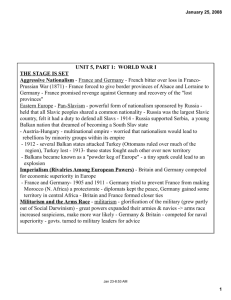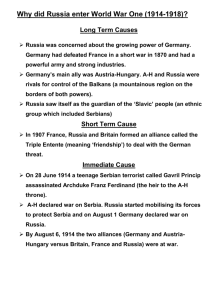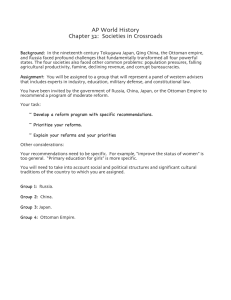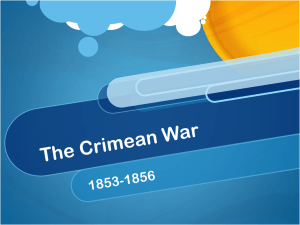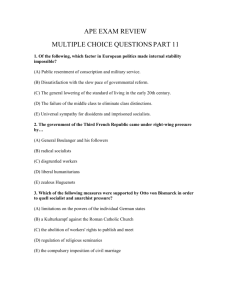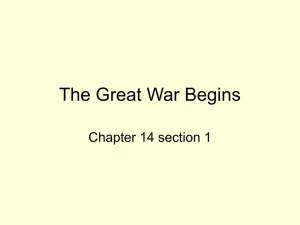Document
advertisement
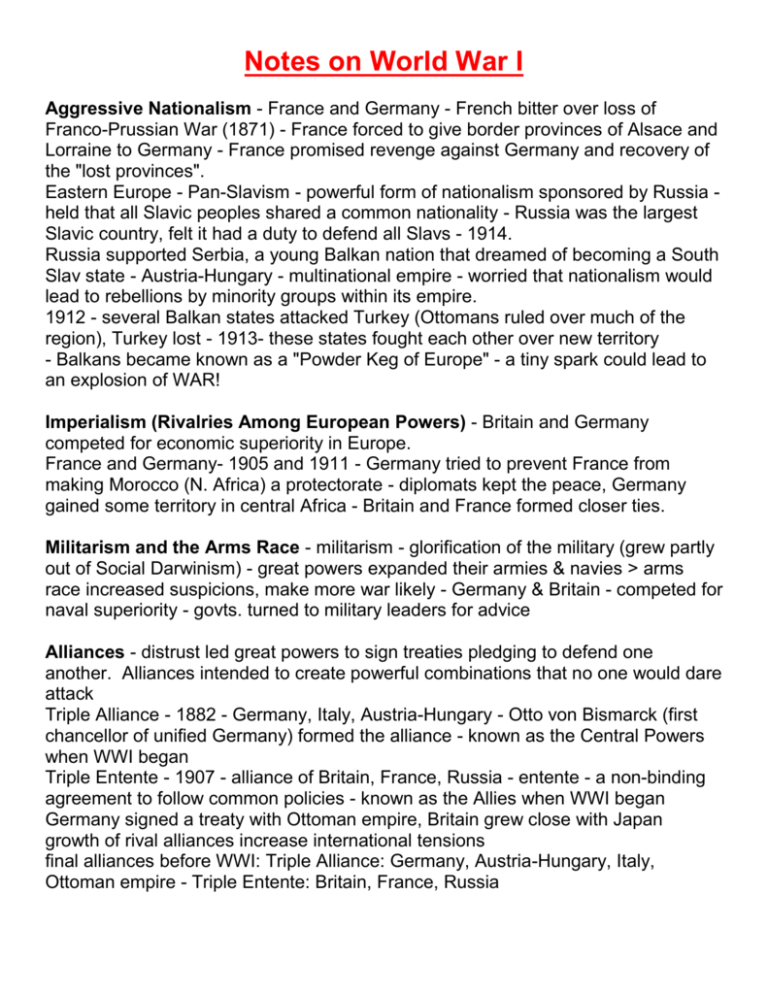
Notes on World War I Aggressive Nationalism - France and Germany - French bitter over loss of Franco-Prussian War (1871) - France forced to give border provinces of Alsace and Lorraine to Germany - France promised revenge against Germany and recovery of the "lost provinces". Eastern Europe - Pan-Slavism - powerful form of nationalism sponsored by Russia held that all Slavic peoples shared a common nationality - Russia was the largest Slavic country, felt it had a duty to defend all Slavs - 1914. Russia supported Serbia, a young Balkan nation that dreamed of becoming a South Slav state - Austria-Hungary - multinational empire - worried that nationalism would lead to rebellions by minority groups within its empire. 1912 - several Balkan states attacked Turkey (Ottomans ruled over much of the region), Turkey lost - 1913- these states fought each other over new territory - Balkans became known as a "Powder Keg of Europe" - a tiny spark could lead to an explosion of WAR! Imperialism (Rivalries Among European Powers) - Britain and Germany competed for economic superiority in Europe. France and Germany- 1905 and 1911 - Germany tried to prevent France from making Morocco (N. Africa) a protectorate - diplomats kept the peace, Germany gained some territory in central Africa - Britain and France formed closer ties. Militarism and the Arms Race - militarism - glorification of the military (grew partly out of Social Darwinism) - great powers expanded their armies & navies > arms race increased suspicions, make more war likely - Germany & Britain - competed for naval superiority - govts. turned to military leaders for advice Alliances - distrust led great powers to sign treaties pledging to defend one another. Alliances intended to create powerful combinations that no one would dare attack Triple Alliance - 1882 - Germany, Italy, Austria-Hungary - Otto von Bismarck (first chancellor of unified Germany) formed the alliance - known as the Central Powers when WWI began Triple Entente - 1907 - alliance of Britain, France, Russia - entente - a non-binding agreement to follow common policies - known as the Allies when WWI began Germany signed a treaty with Ottoman empire, Britain grew close with Japan growth of rival alliances increase international tensions final alliances before WWI: Triple Alliance: Germany, Austria-Hungary, Italy, Ottoman empire - Triple Entente: Britain, France, Russia Assassination in Sarajevo - Serbian Outrage - June 1914 - Archduke Francis Ferdinand of Austria-Hungary visited Sarajevo, the capital of Bosnia (under the rule of A-H) many Serbians were upset by his visit because they saw the Austrians as foreign oppressors. - The Black Hand (also known as Unity or Death) was a Serbian terrorist group who wanted a free South Slav state by uniting Serbia and Bosnia - plotted the assassination of the archduke. - Gavrilo Princip - Serbian nationalist/Black Hand member - he shot and killed the archduke and his wife Sophie in Sarajevo on June 28, 1914 The Conflict Widens - A Harsh Ultimatum - Austrian Emperor Francis Joseph (Francis Ferdinand's uncle) sent Serbia an ultimatum (a final set of demands): 1. Serbia must end all anti-Austrian agitation 2. Serbia must punish any of their officials involved in the murder plot 3. Serbia must allow A-H to take part in the investigation - Serbia agree to some, but not all, of the ultimatum's terms - Kaiser Wilhelm II - leader of Germany - urged A-H to take a firm stand against Serbia, pledged Germany's full support (gave Austria a "blank check") - A-H declared war on Serbia on July 28, 1914 - Czar Nicholas II (leader of Russia) telegraphed his cousin Kaiser Wilhelm II (leader of Germany) - asked him to urge Austria to soften the demands - when this plea failed, Russia began to mobilize (prepare its military forces for war) to protect its ally Serbia - Germany declared war on Russia - when Germany asked Russia's ally France to stay out of the conflict, they refused -> Germany declared war on France - Britain and Italy remained neutral The Schlieffen Plan - named after German General Alfred von Schlieffen - plan was designed to avoid a two-front war (against France in the west & Russia in the east) since Russia would be slow to mobilize, France would be defeated quickly and then Germany would fight Russia - Germany armies attacked France through neutral Belgium - Britain and other powers had signed a treaty guaranteeing Belgium's neutrality -> outraged by invasion of Belgium, Britain declared war on Germany - all major powers were now in the conflict. The Costs of War - 8.5 - 9 million dead, at least 17 million wounded - 1918 - an influenza pandemic (spread of a disease across an entire country) killed more than 20 million people worldwide Financial Burdens - Europe in financial ruins - Allies wanted reparations (payments forwar damage) from Central Powers Political Turmoil - under stress of war, govts. collapsed in Russia, Germany, AustriaHungary, Ottoman empire - unrest swept through Europe's colonial empires The Paris Peace Conference The Big Three: 1. U.S. Pres. Woodrow Wilson - "peace without victory," 14 Pts. 2. British Prime Minister David Lloyd George - wanted to punish Germany 3. French Prime Minister Georges Clemenceau - wished to weaken Germany so it could never threaten France again Paris in 1918-1919 to determine the conditions of post-war Europe Difficult Issues - Italian Prime Minister Vittorio Orlando - demanded that Allies honor their secret agreement to give Italy lands that were once ruled by A-H (a violation of Wilson's idea of self-determination) - self-determination couldn't satisfy everyone (e.g., overlapping territories of ethnicities/nationalities ruled by Russia, A-H, Ottoman empire) - Wilson forced to compromise on his 14 Pts. - however, the League of Nations was created (based on idea of collective security, in which a group of nations acts as one topreserve the peace for all) The Treaty of Versailles - completed, signed in June 1919 at palace at Versailles drawn up by Allies, Germany signed it - they were forced to meet the following conditions: 1. accept full responsibility for the war 2. pay $30 billion in reparations to Allies 3. reduce size of military 4. return Alsace and Lorraine to France 5. lose German territory and overseas colonies to the Allies - Germany greatly resented treaty but had no choice but to sign it - resentment would help spark an even deadlier world war Widespread Dissatisfaction - Self-Determination in Eastern Europe - new nations emerged: Estonia, Latvia, Lithuania (Baltic states), Poland (regained independence after over 100 years of foreign rule), Czechoslovakia, Austria, Hungary, Yugoslavia (South Slav state dominated by Serbia) Mandate System - mandates - territories administered by western powers - Britain and France gained mandates over German colonies in Africa, Ottoman lands in the Middle East -> they became European colonies - colonized people thought they too would gain self-determinations, felt betrayed by the peacemakers Unfulfilled Goals - Italy - still upset it hadn't received lands promised by the Allies in a secret treaty - Russia - not invited to Paris - Poland/Baltic states once part of Russian empire - Japan - their control of parts of China not recognized by Europe Hopes for Global Peace - over 40 countries joined the League of Nations, but not United States - U.S. Senate refused to ratify treaty (U.S. govt. chose an isolationist foreign policy after WWI) - Wilson's dream had become a reality, but not for his own nation - League would be powerless to prevent war
